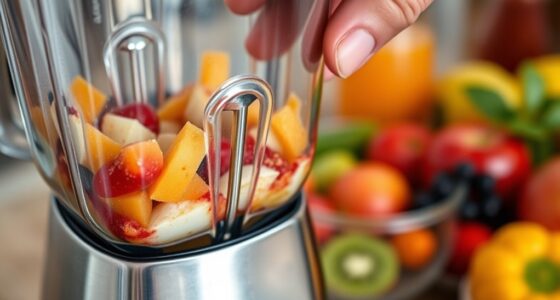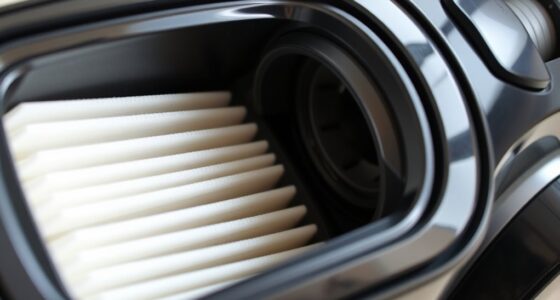Choosing between manual and electric small appliances depends on your routines and priorities. Manual options are durable, energy-efficient, and great for occasional use, requiring only your physical effort. Electric appliances offer convenience, speed, and extra features, making daily tasks easier but often less durable. If you want to find the best fit for your kitchen habits and learn how to make smarter choices, keep exploring the differences to make an informed decision.
Key Takeaways
- Manual appliances are durable and ideal for infrequent use, while electric models excel in convenience for daily tasks.
- Electric appliances offer more features and speed, but manual options require less maintenance and have longer lifespans.
- Consider energy efficiency: manual tools consume no power, making them eco-friendly, whereas electric devices can increase energy costs.
- For tasks needing automation or multiple functions, electric appliances provide greater versatility; manual tools prioritize simplicity.
- Choose manual appliances for low-impact lifestyles and occasional use, and electric ones for convenience and high-frequency kitchen routines.

When choosing small appliances for your kitchen, deciding between manual and electric options can markedly impact your convenience and efficiency. One of the first considerations should be durability comparisons. Manual appliances typically have fewer moving parts and less complex mechanisms, which often means they’re more resilient over time. For example, a manual can opener or a hand-crank coffee grinder can last for years without needing replacement, provided you handle them properly. Electric appliances, on the other hand, tend to have more components susceptible to wear and tear—motors, switches, and electronic parts—that may fail sooner, especially if used heavily or not maintained. If longevity and lower replacement costs appeal to you, manual tools might be the better choice, particularly for tasks you perform infrequently.
Manual appliances offer greater durability with fewer moving parts, making them a reliable choice for infrequent use.
Energy efficiency analysis is another pivotal factor. Manual appliances generally require no electrical power, making them inherently energy-efficient. They rely solely on your physical effort, which means no electricity is consumed during operation. This can lead to significant savings over time, especially if you use certain appliances regularly. Electric models, while often more convenient, consume electricity, and their energy efficiency varies widely depending on the device. For example, an electric blender might use a lot of power relative to a manual hand-crank model, which requires no electricity at all. If reducing your energy footprint is a priority, manual options clearly shine. However, you should also consider the time and effort involved; sometimes, the extra energy used in electric appliances can be justified by the speed and ease they provide.
Additionally, think about the frequency of use and the context of your kitchen routines. If you only need a device occasionally, manual appliances are often sufficient, especially since they don’t rely on power sources and are easy to store. But for daily, heavy-duty tasks, electric appliances might save you time and effort, making your kitchen workflow smoother. Although electric options often come with added features, such as multiple speed settings or programmable functions, these conveniences could be less relevant if you value simplicity and durability.
Ultimately, your choice depends on balancing durability and energy efficiency with your lifestyle needs. If long-lasting, low-maintenance tools are your goal, manual appliances are hard to beat. But if you prioritize speed, ease, and automation, investing in electric models makes sense—just keep in mind their energy consumption and potential for quicker wear. Weigh these factors carefully to decide which type aligns best with your kitchen habits and environmental values.
Frequently Asked Questions
How Do Manual and Electric Appliances Compare in Energy Efficiency?
Electric appliances often consume more energy than manual ones, affecting your energy consumption and environmental impact. However, they usually offer faster, more efficient performance, saving you time. Manual options tend to be more eco-friendly with lower energy use, but may require more effort. Consider your priorities—if energy efficiency matters most, manual appliances might be better, but for convenience, electric ones could be worth the extra energy consumption.
Are Electric Appliances More Durable Than Manual Options?
Think of your appliances as trusted allies; electric options often stand taller in durability comparison, thanks to sturdy parts and consistent performance. They usually have a longer lifespan, but factors like build quality, usage frequency, and maintenance influence this. While electric appliances might seem more resilient, manual options can sometimes outlast if well cared for. Ultimately, durability depends on how you treat them, not just their design.
What Maintenance Is Required for Electric Versus Manual Devices?
Electric appliances generally require more maintenance, like regular cleaning of cords and checking for damage, while manual devices need less upkeep. You should store cords properly to prevent tangles and damage. Keep noise levels in mind; electric models can be louder, so consider this if you value quiet operation. Regularly inspect and clean your appliances to guarantee they run smoothly and last longer, whether manual or electric.
Do Manual Appliances Offer Better Control Over Food Texture?
Did you know that 85% of home cooks prefer manual appliances for better control? Manual appliances offer superior precision control, allowing you to tweak settings for perfect texture customization. With manual tools, you can more easily feel and adjust the consistency, giving you a tactile experience that helps produce the desired food texture. So, if you value control over your food’s texture, manual appliances might be your best choice.
Which Type Is Safer for Children or Elderly Users?
Electric appliances are generally safer for children and elderly users due to built-in safety features like automatic shut-off and easy-to-use controls. Manual appliances often require more strength and coordination, which can pose risks for elderly users or children. You should prioritize child safety and elderly accessibility by choosing electric options with safety locks, non-slip bases, and simple operation, ensuring a safer and more accessible experience for everyone in your household.
Conclusion
Ultimately, whether you choose manual or electric small appliances depends on your needs, your preferences, and your lifestyle. Consider the effort you want to save, the control you desire, and the space you have. Weigh convenience against craftsmanship, speed against precision, and cost against longevity. By understanding your priorities and comparing your options, you can make a smart choice that simplifies your tasks, enhances your kitchen, and suits your way of cooking—because the right appliance makes all the difference.









